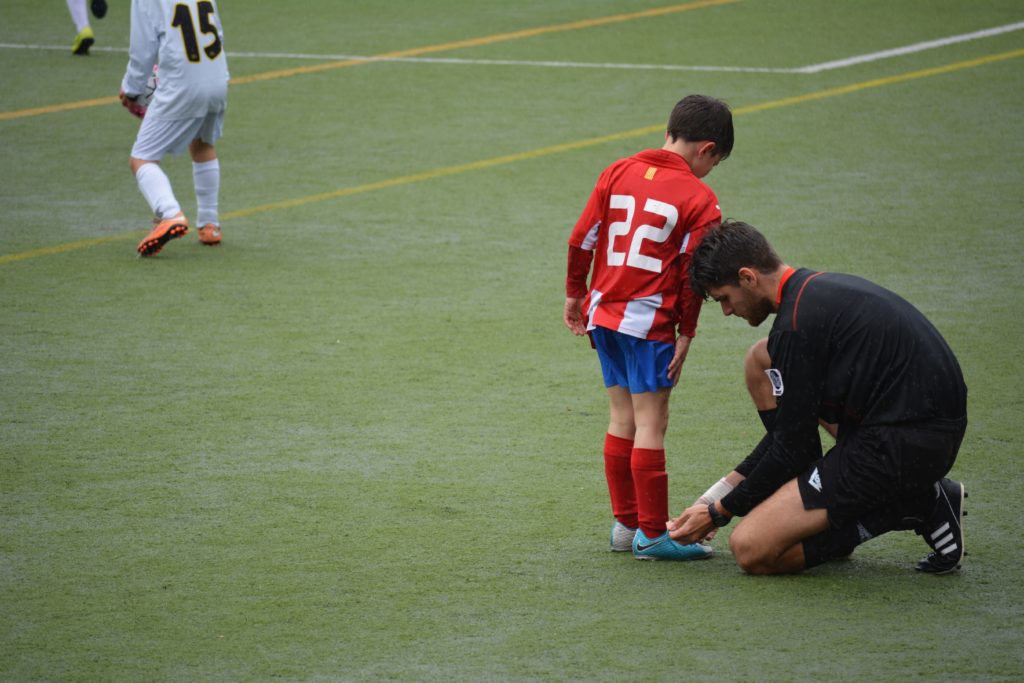
Speaking
One Saturday morning I wait in line at my local bakery, ready to pick-up cinnamon rolls for my family. I’m standing the obligatory six feet behind a young boy and his father, the smells of coffee and fresh baked goods wafting through the air. Neither the loss of an ability to smell that comes with Parkinson’s nor a COVID-19-mandated mask can fully stop the warm sugar, spices, and yeast from reaching my brain.
The excited dark-haired boy wears a red soccer jersey, and from the back of it I learn his name: Cooper. A freshly scraped knee tells part of his story, as does his energy and his attempts to push through several starts and stops in his speech.
Cooper stutters.
Recounting a pre-pandemic soccer game, for his father and maybe for me, too, he speaks especially of how he helped his team win on a penalty kick. Cooper’s voice gets louder as he acts out the scene.
“It was awe–, awe–, awesome, Dad,” he says, before describing, first, how he took notice of the goalkeeper’s position in front of the goal, and then, how he thought he could get the soccer ball past him, and then how nervous he was when lining up to take the kick. Though his speech challenges ebb and flow as he speaks, they never get in the way of his infectious excitement. “And…and…and…and I knew it was good the moment it left my foot, Dad. I knew it.”
His attentive father nods along. “I had no doubt you’d make it, Coop,” he says, “no doubt at all.” Then he extends both arms toward his son and waits for a double fist bump. His smiling eyes rest above a dark blue COVID mask.
Reflecting
I have thought a lot about Cooper and his father since this Saturday morning encounter. Perhaps it is because I know that some people who stutter have a dopamine problem, just as everyone with Parkinson’s does. With Parkinson’s you have too little dopamine in your brain, while some who stutter have too much.
Maybe I keep thinking about Cooper because many of us with Parkinson’s eventually face our own speech problems; challenges that we have to integrate into our relationships and lives if we cannot push past them. I have in mind the challenges of speaking too rapidly, too softly, or with hoarseness, and slurring words as well as stuttering. All of this, and more, can happen with Parkinson’s.
Resolving
Mainly, though, Cooper’s courage and resolve draw me to him, just as his father’s obvious love and devotion do. Despite a joyous view of soccer and, in the main, I gather, of life, I suppose Cooper has also experienced the hurt of teasing; frustration over not being able to communicate as efficiently as he would like; and I wonder if someday he will fear not gaining more control over his stutter.
Here, especially, is where familial love, as well as the encouragement of others, weighs in and fosters courage for pushing through the challenges; courage that, otherwise, we might not know we have.
Courage and resolve. Love and devotion. A boy who stutters, his faithful father, and a bystander with Parkinson’s disease; all of us with smiling eyes, six feet apart but with fewer than six degrees of neurologic separation between us.
Like his father, I believe Cooper will make it.
I believe I will, too.
__________
Photo by Adrià Crehuet Cano on Unsplash
Allan Cole is a professor in The Steve Hicks School of Social Work at The University of Texas at Austin and, by courtesy, professor of psychiatry and behavioral sciences in the Dell Medical School. Diagnosed with Parkinson’s in 2016, at the age of 48, he serves on the Board of Directors at Power for Parkinson’s, a non-profit organization that provides free exercise, dance, and singing classes for people living with Parkinson’s disease in Central Texas, and globally via instructional videos. He also serves as a Community Advocate for ParkinsonsDisease.net, and as a regular guest contributor to the Michael J. Fox Foundation’s Team Fox Blog, writing columns about living well with Parkinson’s. He is author or editor of 10 books on a range of topics related to bereavement, anxiety, and spirituality. His latest books, Counseling Persons with Parkinson’s Disease (Oxford University Press) and Discerning the Way: Lessons from Parkinson’s Disease (Cascade), will be published in 2021. Follow him on Twitter @PDWise.
